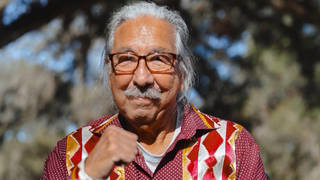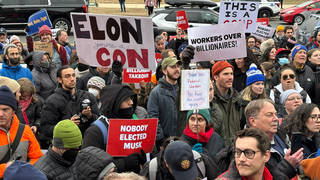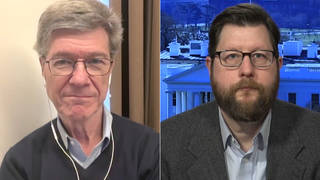
Related
Statewide primaries were held Tuesday in four states. In Colorado, a record turnout saw Senator Michael Bennet beating out progressive challenger Andrew Romanoff in the state’s Democratic Senate primary. In Connecticut, the professional wrestling magnate Linda McMahon beat out former Congress member Rob Simmons in the Republican Senate primary. McMahon will face Connecticut Attorney General Richard Blumenthal to fill the seat left vacant by the retiring Senator Christopher Dodd. We speak to columnist, author and radio host David Sirota. [includes rush transcript]
Transcript
AMY GOODMAN: We turn now to the primaries that took place on Tuesday. They were held in Colorado, Connecticut, Georgia and Minnesota.
In Colorado, a record number of voters turned out for the Senate and gubernatorial primaries. Democratic Senator Michael Bennet beat progressive challenger Andrew Romanoff, while in the Republican Senate race, tea party favorite Ken Buck beat former lieutenant governor Jane Norton, who had the backing of the Republican establishment.
To talk more about the results and what they mean for the midterm elections in Novemeber, we’re joined in Denver by the columnist, author and radio host David Sirota. He joins us by Democracy Now! video stream.
Hi, David.
DAVID SIROTA: Hi, Amy. How are you doing?
AMY GOODMAN: Good. Talk about what happened in your state, in Colorado.
DAVID SIROTA: Well, we had — on the Democratic side, we had a situation where there was a candidate, Michael Bennet, the appointed senator, who had raised about $8 million, had the backing of the entire Washington establishment, including President Obama, and former House Speaker Andrew Romanoff raised less than about $2 million. And in the end, it just wasn’t enough. Romanoff came up with about 46 percent of the vote. Bennet ended up with about 54 percent of the vote.
My take on this race is pretty simple. The fact that Andrew Romanoff, with so little money, but with a big grassroots campaign, running on progressive themes, a progressive promise to get money out of politics — he didn’t take PAC money — the fact that he was even mildly in this race is, I think, a statement that about half the Democratic Party in this swing state is willing to be completely and totally independent of the administration and of the top-down Democratic Party in the state and nationally.
AMY GOODMAN: Talk about what Andrew Romanoff represented, why he was almost able to upset Bennet, Senator Bennet.
DAVID SIROTA: Well, his campaign was laser-focused on the influence of money in politics. All of his ads were about how Senator Bennet’s money — Senator Bennet became one of the top corporate fundraisers in the entire United States Congress in seventeen months. Romanoff focused intently on that and focused intently on the corrosive impact of money on political decisions. He made a contrast with Bennet on issues like the public option, like cramdown — the allowing the government to force banks to renegotiate loans for homes in foreclosure. So it was a very populist economic campaign. It was about the influence of big money. And I think it resonated. I think — look, again, I should go back to this idea, the fact somebody got 46 percent of the vote against an incumbent with $8 million and the entire backing of the Washington establishment, I think what this represents is a real foment inside the Democratic Party on the progressive side that says, you know, about half the Democratic Party is simply not happy with the direction of the national Democratic Party.
AMY GOODMAN: And what about the tea party victory in Colorado?
DAVID SIROTA: Well, this is — I mean, this is equally as stunning. Ken Buck, the Weld district attorney, defeating essentially the Republican equivalent of Michael Bennet, a big-money-backed candidate, Lieutenant Governor Jane Norton. And frankly, Amy, I think Ken Buck is a very strong candidate in this general election now, moving forward. I think that what you have here is you’ve got Michael Bennet, who has been introduced, effectively, in his first race for office — he was appointed, so he had never run before — he was introduced in this primary to Colorado as a guy who is very close to the Obama White House and a guy who really represents a huge amount of Wall Street money. I think Ken Buck has the potential to run a campaign where he goes after Bennet from both the left and the right. He makes a kind of left-right critique of Bennet’s ties to Obama, ties to big corporate money, and then also makes a conservative critique along the lines of the traditional tea party folks. So I think it’s going to be a very interesting race. It really is going to pit Obama, I think, the Obama brand, versus a kind of left-right populism.
AMY GOODMAN: And the famous comment that Buck made about Obama’s citizenship?
DAVID SIROTA: Well, I think, you know, that’s an interesting point. I don’t know how Michael Bennet is going to use that. My guess is Ken Buck will try to moderate, if not his positions, then his rhetoric. I’m sure that Bennet will try to highlight that rhetoric and show Ken Buck as a conservative extremist. And he certainly is, on many issues, a conservative extremist. Again, though, I’m not so sure how much Michael Bennet will want to, in this swing state here, bring up and continue tying himself so closely to President Obama in a general election.
AMY GOODMAN: What about Connecticut, where Dodd, Senator Dodd, is retiring? The significance of this race?
DAVID SIROTA: Well, you know, I think that this is, again — you’re going to see this outsider-insider idea being floated. Richard Blumenthal, you know, he has been in state politics — the Democratic attorney general, he’s been in state politics for years. Linda McMahon, will she be able to make a campaign that says that she — that he is an insider, because he’s been in state politics? She might. And I think this dynamic continues to grow. And I also think, in Connecticut, Ned Lamont, who I worked for when he ran for Senate, I think this is actually an even bigger commentary. Ned Lamont, in the gubernatorial race, ran more to the conservative business side of that primary and ended up losing. And so, I think, again, it’s another example of, within the Democratic Party, you have a sizable group of the Democratic Party saying that they want the Democratic Party to stick to core progressive principles.
AMY GOODMAN: I wanted to ask you, David Sirota, about the comments of Robert Gibbs, talking about — well, attacking progressives. In an interview with the newspaper The Hill, Gibbs said critics who liken some of Obama’s policies to those of former President George W. Bush should, quote, “be drug tested.” Gibbs went on to blast what he called “the professional left,” saying, quote, “They will be satisfied when we have Canadian healthcare and when we’ve eliminated the Pentagon. That’s not reality.” What’s your response, David Sirota?
DAVID SIROTA: Well, my response is that the Obama administration is obviously frustrated with its — where it is in the polls, and it doesn’t really understand what a progressive movement is, as separate from a presidential administration. I actually think that Barack Obama himself probably does understand that there is an importance of having a movement pushing an administration for particular policies. This is the lesson of every successful social movement in history. And I think Obama himself understands that. Unfortunately, President Obama, upon becoming president, put a lot of Washington insiders into the government. Those are people who are really not interested, and have never worked with, don’t really understand the value of, social movements that are independent of an administration.
Look, I’ve known Robert Gibbs for years. Robert Gibbs has worked as the spokesperson for the Democratic Senatorial Campaign Committee, the Democratic Party, in general. This is not a person who is comfortable with the idea of a progressive movement — any movement — really pushing an administration. This administration, the staffers in this administration, truly believe that they should be able to give orders to progressive organizations, progressive voters, and that those orders should be followed without question. And I think this tension between the progressive movement and the Obama administration is only going to continue, especially if President Obama does not advocate many of the progressive policies, does not fight for many of the progressive policies, that he campaigned on.
AMY GOODMAN: David Sirota, I want to thank you for being with us, Colorado-based columnist, author and radio host. He’s streaming at www.am760.net.












Media Options